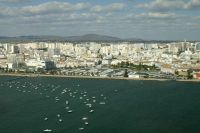The Algarve’s name originates from the Arabic Al-Gharb, meaning “The West”, though travelers from the Western world will recognize it as the southernmost portion of Portugal. When placed on the world stage, the region has plenty to be proud of. For one, it is one of the most popular tourist destinations within Europe: this is an honor it has held since at least the 1980s, and the result of a steady accrual of fame that began when tourism in Portugal shifted away from the traditional thermal spa towns.
The Algarve’s tourist numbers quintupled over the period from 1950-1960, and by 1986 it was reported as “the fifth largest net earner from foreign tourism in Western Europe” (and still being advertised, ironically enough, as the “best kept secret in Europe” despite this surge in popularity). The region’s geographic position makes it convenient for day trips by Spanish shoppers, whose tightening purses may keep them from going further afield on holidays, and the earlier governmental decision to rename the region “the Allgarve” pointed to its ongoing efforts to court English-speaking visitors from the UK and elsewhere. If we zoom in on a specific region of the Algarve – Vilamoura – we find Europe’s largest luxury tourist complex and marina.With all this in mind, expatriates are fully justified in wondering what value the region has as a full-time residence, and if it resists the “it’s a nice place to visit, but…” associated with heavily trafficked tourist areas. As of 2008, the region had the second-highest GDP per inhabitant within Portugal, placing it just behind the obvious capital of Lisbon (which is, incidentally, the tenth wealthiest metro region on the European continent).
Local economy of the Algarve
The region’s economic profile is very much defined by the tourist industry and the seasonal nature thereof. Local unemployment can therefore hover around 11-12% because of the economy’s being skewed towards tourism (local fishing and agriculture is also on the decline). Small businesses – those with twenty employees or fewer – are by far the predominant type of business in the area, accounting for some 99% of total regional commerce. Corporate headquarters and large manufacturing/ warehousing bases seem to be nonexistent here. Owing to this, executive-level employees employed by major firms may find that living in the Algarve necessitates lots of travel to other European hubs of business.
Workers within the various tech-aided creative and IT industries, who are already familiar with setting up shop anywhere a broadband internet connection exists, may find this to be a wonderful place of residence from which to conduct at-home work. However, we then have to ask if the income from these professions is sufficient to offset the living costs of the region. Employees in these fields must also make sure to secure a special “teleworking” contract, which has a fixed duration of three years.
Cost of living in the Algarve
The recent tax increases, following on the heels of the Euro-austerity crisis of the past few years, have ensured that the price of essentials within Algarve will be increasing in the near future until Portugal meets its deficit reduction goals. The VAT can cause some restaurant meals and entertainment events to be taxed up to the maximum allowable 23%, and many supermarket essentials (particularly beverages) have jumped from a 6% VAT to that 23% cap. High-level executives and entrepreneurs should also be prepared to deal with the progressive income tax affecting the whole of Portugal, though residents of Germany, Italy, and The United Kingdom may already be familiar with a highly comparable rate of taxation.
On this note, prospective residents should certainly also consider the Portuguese situation as a whole: the Algarve is by no means an autonomous region exempt from the Portuguese governmental dictates. For example, whether you reside in Lisbon or the Algarve, your residency will be dependent on maintaining a minimum income of around 450 Euros per month – this should be no problem for expat professionals, though you should still be prepared to present bank statements or other documents testifying to your earnings.
Buying property in the area is a process that will also, irrespective of your location in Portugal, become quite complicated and bureaucratic and will certainly require the retention of a Portuguese-fluent lawyer if you do not feel up to the task of translating both Portuguese and legal-ese. If you manage to do this, the sky is the limit in the Algarve for humble dwellings and luxurious palaces alike. In the latter category is one actual castle, the Castelo do Moinho in the municipality of Loule, while the ultra-modern, eight-bedroom Lake House in Vilamoura is nothing to sneeze at either (selling prices for either are not a matter of public record, but you can easily inquire with a Sotheby’s International realtor to find out more).

